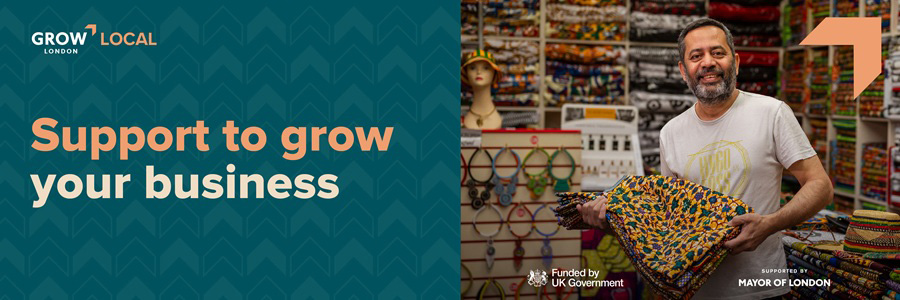Franchising: a growth strategy for London's small business owners

Grow London Local
Posted: Tue 16th Sep 2025
Most small business owners don't set out to become franchisors. You start with one location, put your energy into getting it off the ground and somewhere along the way, people start asking: "When are you opening another one?"
Scaling a business in London isn't easy. Costs are high, time is short and taking on more responsibility can feel like a risk too far.
But franchising offers another route – one that doesn't involve opening every new site yourself or taking out a massive loan to expand.
If you're thinking about growing your business but aren't sure how, or you're considering buying into something already established, franchising could be the bridge between where you are now and where you want to go.
The challenge is knowing how it works, what's involved and whether it's the right fit for you.
What is franchising, really?
At its core, franchising is a partnership. One party – the franchisor – owns a brand, business model and system for how it operates.
They grant another party – the franchisee – the right to operate under that brand, usually in exchange for an upfront fee and ongoing royalties.
Think of it as renting a business model that's already been proven to work. As a franchisee, you get the blueprint, the training and the brand recognition. As a franchisor, you expand your footprint without managing every location yourself.
It's not a "one-size-fits-all" arrangement, but when done well, it can be a win-win.
Why franchising can be good for small businesses
For small businesses with a loyal base of local customers and a unique offer, franchising can be a smart growth strategy. Here's why:
Less risk: instead of investing your own money to open new locations, you allow franchisees to invest theirs. That spreads the financial risk and allows you to scale without borrowing or giving away equity.
Built-in brand recognition: franchisees benefit from the reputation you've built. A strong brand means they can open with instant credibility – especially important in a city like London, where competition is fierce.
Support on both sides: franchisors typically offer training, marketing materials, supplier relationships and systems that franchisees can plug into. It means smoother operations and consistency across locations.
Entrepreneurship without reinvention: for franchisees, the appeal lies in owning a business without starting from scratch. You get autonomy, but with the safety net of a tried-and-tested concept.
But it's not without challenges
Franchising comes with its own complexities – and they're worth thinking through before diving in.
Legal obligations: franchise agreements are legally binding documents that set out everything from territory rights to quality standards.
Both parties need legal advice to make sure they understand what the law says they must (and mustn't) do.
Costs can stack up: for franchisees, the initial buy-in can be steep, often including fees for training, branding, fitting out the premises and equipment.
For franchisors, developing a franchise-ready business model and legal framework involves upfront investment too.
Maintaining a consistent brand: with more locations comes the challenge of keeping quality high and the customer experience consistent. One bad franchise can harm the entire brand.
Ongoing support isn't optional: as a franchisor, you'll need to continue offering your franchisees training, marketing guidance and operational support. It's a long-term relationship, not a one-off transaction.
Franchising in London: a local snapshot
London is fertile ground for franchising. Its dense population, diverse neighbourhoods and appetite for new experiences create plenty of opportunities – but also unique pressures.
Thriving sectors: food and drink remain strong players – particularly in niche fast-casual dining, artisan bakeries and health-conscious eateries. Beauty and wellness, pet services, home care and tech repair are also seeing steady growth.
Commercial space: rent can be eye-watering in central zones, so many franchises now focus on high-street locations in outer boroughs or mobile/service-based models with lower overheads.
Regulation: there's no specific franchise law in the UK, but general business, employment and trading laws do apply. The British Franchise Association (BFA) plays a key role in setting industry standards and is a good resource for guidance.
How to choose the right franchise (or franchisee)
Whether you're looking to join a franchise or franchise your own business, due diligence is essential.
If you're buying into a franchise
Research the brand: is the model successful in a number of different locations? Are existing franchisees happy and profitable? Don't be shy – ask for real-world data and speak to other operators.
Understand the agreement: get legal advice before signing anything. Understand the restrictions, obligations and what support you'll receive in return.
Check for BFA accreditation: while not mandatory, BFA membership is a good sign that the franchise has been through a vetting process.
If you're franchising your own business
Get your house in order: your operations, systems and customer experience need to be rock-solid. If you can't explain your success clearly to someone else, you're not ready to replicate it.
Define your offer: what exactly are you selling to franchisees? How will they make money? What support will you offer? These are questions you'll need to answer in detail.
Invest in legal and financial advice: franchise contracts are complex, and you'll need a franchise operations manual and disclosure documents that cover all bases.
Getting started: first steps on either side
If you're franchising your business
Assess whether you're ready: is your business profitable, repeatable and distinctive?
Get advice: speak to franchise consultants or legal experts.
Develop the model: create documentation, training programmes and support systems.
Recruit smartly: look for franchisees who share your values and understand your market.
Pilot it: start small and prove the model before expanding widely.
If you want to become a franchisee
Explore your interests: what industries appeal to you? Where can you add value?
Compare opportunities: look beyond big names. Niche or emerging brands might offer more flexibility.
Check the numbers: understand the upfront investment, ongoing costs and realistic expectations around income.
Talk to franchisees: get the inside story from those already in the system.
Seek professional advice: an accountant and solicitor with franchise experience can help you navigate the paperwork.
Final thoughts
Franchising can be a powerful way to grow a business or step into business ownership with guidance and structure.
For small business owners in London, it offers a pathway to expand without overextending. And for aspiring entrepreneurs, it's a chance to run a business with a head start.
The key, as always, is to do your homework. Ask the right questions. Speak to people on the ground. And treat franchising not as a shortcut, but as a serious business venture that deserves careful planning – because done right, it can transform the way you grow.
Read more
Grow London Local: Support for London's small businesses
No matter where you're based in London, you'll find relevant support and guidance on business planning, sales and marketing and much more, as well as opportunities to connect with like-minded business owners. Visit Grow London Local now
Grow London Local
Disclaimer: The views expressed in this content is solely that of the author and does not necessarily reflect the view of Grow London Local. Grow London Local accepts no liability for any loss occasioned to any person acting or refraining from action as a result of any material in this publication. We recommend that you obtain professional advice before acting or refraining from action on any of the contents of the content.
Subscribe now
Never miss a post with the latest insights and updates.
You can view a sample here.
By subscribing you agree to our Terms of Use and Privacy Policy. You can unsubscribe at any time by using the "Unsubscribe" link at the bottom of any email we send you.
